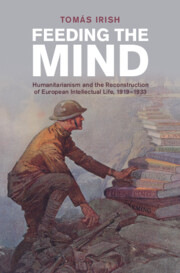‘In the tumultuous aftermath of the Great War, governments, humanitarian organizations, and philanthropists, driven by their preoccupation with civilizational decline, mobilized both to save intellectuals - identified as a category especially deserving of assistance - and to rebuild institutions of knowledge. This neglected history of ‘intellectual relief’ is the great topic of Tomás Irish’s innovative, and powerful book. His new research should be widely read at a time when intellectual life and cultural heritage are constantly threatened by the many crises of the new millennium.’
Bruno Cabanes - Ohio State University
‘This book reveals how humanitarianism after 1918 was inspired as much by the desire to feed minds as hungry bodies. Middle-class youth is at the heart of an exciting history that binds the reconstruction of Europe with the battle to revive faith in the value of learning and international exchange.’
Patricia Clavin - University of Oxford
‘Touching, among other things, on aspects of institutional history, cultural history, the history of political language, the history of intellectuals, and the history of knowledge, while not shying away from the nitty-gritty details of humanitarian practices, the brick-and-mortar aspects of the reconstruction of repositories of knowledge, or the logistics involved in the physical transmission of books, Feeding the Mind treats its subject from what one might call a total-historian perspective. Based on impressive archival research, this wide-ranging approach adds immense flavour to the post-war period, from the First World War to Locarno and reveals some of the ways in which the war experience shaped the post-war world. The book, then, offers rich insights to students and scholars of the interlinked histories of war, intellectuals, and humanitarianism, as well as those grappling with the First World War’s impact on the post-war era’s societies and intellectual lives.’
Frederik Forrai Ørskov
Source: First World War Studies
‘… a vital contribution to readers' understanding of European culture between the world wars … Recommended.’
R. W. Lemmons
Source: CHOICE



